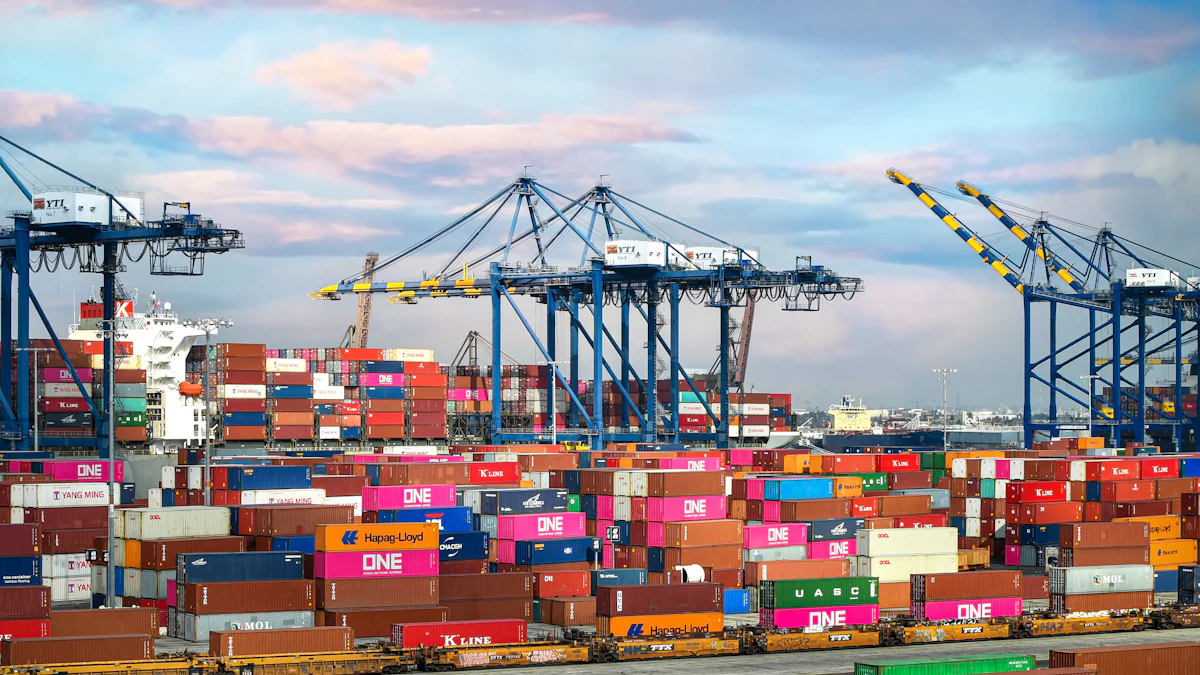What Is Integrated Logistics Support with JUSDA? Your In-Depth Guide

Integrated logistics revolutionizes modern supply chains by harmonizing all operational facets to ensure swift product delivery and exceptional customer service. The seamless integration of transportation, warehousing, information technology, and collaboration optimizes resource utilization, reduces costs, and enhances service levels. JUSDA, a leading supply chain management platform authorized by Foxconn Technology Group, plays a pivotal role in this landscape. With over 20 years of expertise, JUSDA empowers businesses with tailored solutions that drive efficiency and innovation.
What Is Integrated Logistics?
In the realm of supply chain management, Integrated Logistics stands as a pivotal model that harmonizes various components to create a seamless and efficient system. This approach combines transportation, warehousing, information technology, and collaboration into a unified structure that optimizes operations. By aligning all these elements, companies can ensure swift product delivery and exceptional customer service.
As an expert in logistics management once stated, "Integrated logistics is a business management model that combines various supply chain components to create a unified, efficient system." This integration ensures that all departments and resources work together seamlessly to dispatch customer orders quickly.
Moreover, according to experts in supply chain management, integrated logistics plays a crucial role in optimizing Supply Chain Management (SCM). By synergizing logistics activities, companies can improve customer service, reduce costs, optimize inventory levels, streamline operations, enhance flexibility, and drive continuous improvement. This optimization of SCM KPIs allows companies to meet customer expectations effectively and achieve long-term success.
Business strategists define integrated logistics as a comprehensive approach to supply chain management—from raw material procurement to final product delivery. This holistic view ensures that every aspect of the supply chain is interconnected and operates efficiently.
Integrated Logistics vs Traditional Logistics
When comparing Integrated Logistics with traditional approaches, the difference lies in the level of cohesion and efficiency achieved. In traditional logistics setups, each component operates independently without a unified strategy. On the other hand, integrated logistics aligns transportation, warehousing, information technology systems, and collaboration efforts towards common goals.
By integrating these key elements as part of Integrated Logistics, businesses can achieve higher levels of operational efficiency. Transportation becomes more streamlined with optimized routes and timely deliveries. Warehousing processes are enhanced through better inventory management practices. Information technology systems provide real-time data for decision-making purposes. Collaboration efforts ensure that all stakeholders work together seamlessly towards common objectives.
This shift from traditional siloed approaches to an integrated system has significant benefits for businesses looking to enhance their supply chain operations.
Integrated Logistics Support Lifecycle

When considering the Design Interface in integrated logistics support, companies focus on creating systems that enhance operational efficiency. By designing interfaces that facilitate seamless communication between different departments, businesses can optimize their processes and ensure smooth coordination.
In terms of Supply Support, organizations prioritize ensuring a steady flow of resources to meet demand. This involves strategically managing inventory levels, coordinating with suppliers, and implementing efficient procurement strategies. By providing robust supply support, companies can maintain continuity in their operations and meet customer needs effectively.
Maintenance Planning plays a crucial role in integrated logistics support by preemptively addressing maintenance requirements. Companies develop detailed plans for equipment upkeep, repair schedules, and replacement strategies to minimize downtime and ensure operational continuity. Through proactive maintenance planning, businesses can enhance equipment reliability and optimize overall performance.
Packaging, Handling, Storage, and Transportation (PHS&T)
When it comes to Packaging, Handling, Storage, and Transportation (PHS&T) within integrated logistics support, each aspect plays a critical role in ensuring the seamless flow of goods throughout the supply chain.
Efficient packaging not only protects products during transit but also optimizes space utilization in warehouses.
Handling procedures are designed to minimize product damage and ensure accurate order fulfillment.
Proper storage practices involve organizing inventory strategically for easy access and inventory management.
Effective transportation solutions guarantee timely delivery while minimizing costs.
Incorporating advanced technologies like automated packaging systems (WMS) enhances the efficiency of these processes. Moreover, continuous training on best practices ensures that staff members are well-equipped to handle all aspects of PHS&T effectively.
Case studies have shown that by implementing robust PHS&T strategies, companies can significantly reduce operational costs while improving overall customer satisfaction levels through faster and more reliable deliveries.
Technical Data and Support Equipment
In the realm of integrated logistics support, having access to accurate technical data and reliable support equipment is paramount for maintaining operational excellence.
Precise technical data aids in troubleshooting issues swiftly and optimizing equipment performance.
High-quality support equipment ensures that maintenance tasks are carried out efficiently without disruptions.
By integrating cutting-edge technologies into technical data management systems, businesses can streamline their operations further. This includes leveraging predictive maintenance tools to preemptively address potential equipment failures before they impact operations negatively.
Successful implementation of technical data management practices has been evident in various case studies where companies reported improved equipment reliability and reduced downtime through proactive maintenance planning.
Training and Training Support
Training is an integral component of integrated logistics support as it equips employees with the necessary skills to navigate complex supply chain scenarios effectively.
Ongoing training programs ensure that staff members stay updated on the latest industry trends and best practices.
Tailored training support enables employees to handle diverse challenges with confidence.
By incorporating real-world case studies into training sessions, companies can provide practical insights into handling unique supply chain situations. These case studies serve as valuable learning tools that enhance job performance and productivity among employees.
Evidence from success stories highlights how targeted training initiatives have resulted in significant improvements in operational efficiency and employee morale across various organizations.
Manpower and Personnel
Personnel within an integrated logistics framework are the driving force behind operational excellence. Their expertise and dedication ensure seamless coordination across all supply chain functions. By investing in continuous training programs, companies equip their manpower with the skills necessary to navigate complex scenarios effectively. This approach not only enhances job performance but also boosts overall productivity levels.
Incorporating real-world case studies into training sessions provides practical insights for personnel to handle diverse challenges confidently. These studies serve as valuable learning tools that empower individuals to make informed decisions and drive process improvements. Through tailored training support, employees gain a deeper understanding of industry trends and best practices, enabling them to contribute meaningfully to the organization's success.
Benefits of Integrated Logistics with JUSDA

In the realm of integrated logistics, JUSDA stands out as a key player in driving operational excellence and customer satisfaction. Let's delve into the benefits that businesses can reap by leveraging Integrated Logistics Support (ILS) solutions with JUSDA:
Cost Reduction
Implementing ILS strategies with JUSDA leads to optimized resource allocation and streamlined processes.
By harmonizing transportation, warehousing, and IT systems, companies can achieve significant cost savings.
Enhanced supply chain visibility and efficiency result in minimized operational expenses.
Enhanced Customer Service
Leveraging JUSDA's expertise in integrated logistics ensures timely order fulfillment and improved service levels.
Seamless collaboration among stakeholders guarantees a superior customer experience.
Tailored ILS solutions empower businesses to meet dynamic customer demands effectively.
Streamlined Operations
Integrated logistics support from JUSDA enhances process efficiency and reduces bottlenecks.
By aligning maintenance planning and technical data management, operations run smoothly.
The seamless flow of goods facilitated by PHS&T practices ensures agile and streamlined operations.
Improved Supply Chain Management
Technical Documentation: Technical documentation plays a crucial role in enhancing equipment maintenance within the supply chain. By providing comprehensive operation manuals, maintenance procedures, troubleshooting guides, and spare part management instructions, businesses ensure that equipment users and maintenance teams have the necessary information for effective upkeep. Inadequate or inaccurate documentation can lead to reduced equipment reliability, impacting availability and increasing operational costs.
Training for Personnel: Alongside technical documentation, offering thorough training programs for personnel is essential. Continuous training ensures that employees are equipped with the skills and knowledge required to navigate complex supply chain scenarios effectively. By investing in training initiatives, companies empower their workforce to handle diverse challenges confidently and contribute meaningfully to improved supply chain management.
Technical Manuals: Utilizing various technical manuals such as traditional manuals, Interactive Electronic Technical Manuals (IETM), and Computer-Based Training (CBT) resources further enhances integrated logistics support. These manuals provide detailed insights into equipment operation, maintenance procedures, troubleshooting steps, and training modules tailored to improve personnel capabilities within the supply chain ecosystem.
JUSDA's Integrated Logistics Services
Overview of JUSDA's Services
JUSDA, a prominent player in the logistics industry, offers a comprehensive array of integrated logistics services tailored to meet diverse business needs. The company's commitment to operational excellence and customer satisfaction is evident in its service offerings that encompass Logistics solutions from procurement to delivery.
Procurement Solutions: JUSDA provides end-to-end procurement services that ensure seamless sourcing of raw materials and components. By leveraging strategic partnerships and robust supply chain networks, JUSDA streamlines the procurement process for enhanced efficiency.
Inventory Management: Efficient inventory management is crucial for optimizing supply chain operations. JUSDA's advanced inventory solutions enable real-time tracking, demand forecasting, and stock optimization to minimize carrying costs and ensure product availability.
Distribution Services: Timely and accurate distribution is key to meeting customer demands. JUSDA's distribution services focus on route optimization, last-mile delivery, and order fulfillment to guarantee swift and reliable product delivery.
Customs Clearance: Navigating complex customs regulations can be challenging for businesses. JUSDA offers expert customs clearance services that facilitate smooth cross-border transactions, ensuring compliance with international trade laws.
Supply Chain Visibility: Enhanced visibility into supply chain processes is essential for informed decision-making. JUSDA's innovative tracking technologies provide real-time insights into shipment status, inventory levels, and order fulfillment progress.
Integrated logistics stands as the cornerstone of modern supply chains, offering unparalleled benefits such as streamlined operations and cost reduction. JUSDA, a frontrunner in B2B logistics, redefines industry standards through innovative supply-chain management solutions. By integrating cutting-edge technology into its services, JUSDA paves the way for future advancements in logistics support. The strategic focus on financial services further solidifies JUSDA's position as a leader in the field.
See Also
Unveiling JUSDA's Logistics Solutions: Deciphering High-Tech Manufacturing
Unlocking Efficiency: JUSDA's Logistics Technology at Your Service
Efficiency Redefined: JUSDA's Logistics Optimization Strategies
Exploring JUSDA's Training Sessions: Logistics Excellence Unveiled
Analyzing JUSDA's Smart Logistic Systems Implementation: A Case Study
